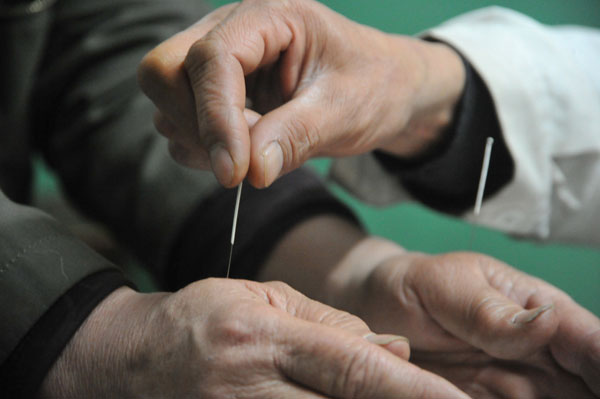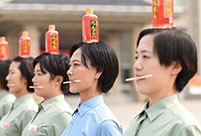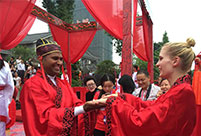

 |
| Acupuncture, a significant part of traditional Chinese medicine, has been widely used to treat a range of conditions in the country's TCM hospitals. [Photo from China Daily] |
The sex-booster herb Schisandraceae, widely used in traditional Chinese medicine for 2,000 years, has shown promise in treating HIV/AIDS, according to a 20-year-long study led by the Kunming Institute of Botany of the Chinese Academy of Sciences.
Native to North China, the Korean Peninsula and Russia, the plant has been used in TCM treatment as a tonic that enhances the function of the liver and kidneys and improves memory and sexual performance.
Notably, several derivatives of the herb's lignin, which is the compound extracted from the leaves and stems of the woody vine plant, have strong anti-HIV properties and low toxicity, according to Sun Handong, an academician at the Chinese Academy of Sciences who led the research.
"The lab-engineered derivatives can kill HIV, so the finding paves the way for future anti-HIV drug research and development," he said.
However, whether the finding will lead to a cure for HIV/AIDS won't be known anytime soon. "It definitely will require more research and takes a long time," Sun said.
Preclinical research into the anti-HIV derivatives has been carried out with the support of the National Major Scientific and Technological Special Project, according to Pu Jianxin, a researcher for the study.
Wang Jian, a TCM doctor who specializes in HIV/AIDS treatment at the Beijing-based Guang'anmen Hospital of the China Academy of Chinese Medical Sciences, urged further research.
"The findings are still preliminary, and whether it works on the clinical side remains a question," Wang said.
Since 2004, China has treated more than 27,000 sufferers of HIV/AIDS with TCM treatment. Studies found that with a combination of mainstream antiretroviral therapy and TCM treatment, the patients benefited in particular by experiencing boosted immunity, he said.
"Current TCM treatment for HIV/AIDS mainly focuses on immunity maintenance. Unlike that, the Schisandraceae study showed that the compound can kill the virus itself," Wang added.
Pu, one of the study's researchers, said that to advance research and development of new drugs, such studies of natural products will play an increasing role.
Among the drugs derived from natural compounds, the anti-malaria treatment qinghaosu, also known as artemisinin, is the most well-known among the Chinese. Pharmaceutical chemist Tu Youyou and her team screened over 2,000 TCM herbs and eventually discovered that artemisinin from sweet wormwood, an aromatic herb used widely in TCM, was an effective treatment for malarial fever.
 Models change clothes on street in Hangzhou
Models change clothes on street in Hangzhou Charming iron ladies in China's upcoming V-Day celebrations
Charming iron ladies in China's upcoming V-Day celebrations In pics: armaments displyed in massive military parade
In pics: armaments displyed in massive military parade Charming Chinese female soldiers
Charming Chinese female soldiers Volunteers required not taller than 5ft 5in
Volunteers required not taller than 5ft 5in  Czech pole dancing master teaches in Xi'an
Czech pole dancing master teaches in Xi'an Shocked! PLA smokescreen vehicle drill
Shocked! PLA smokescreen vehicle drill Foreigners experience tranditional Chinese wedding
Foreigners experience tranditional Chinese wedding Blind date with bikini girls in Nanjing
Blind date with bikini girls in Nanjing The lows of getting high
The lows of getting high  China vows rule of law in Tibet
China vows rule of law in Tibet  Refugee crisis diminishes US leadership
Refugee crisis diminishes US leadership Proud, not so loud: Uganda’s secret LGBT beauty contest
Proud, not so loud: Uganda’s secret LGBT beauty contest Day|Week